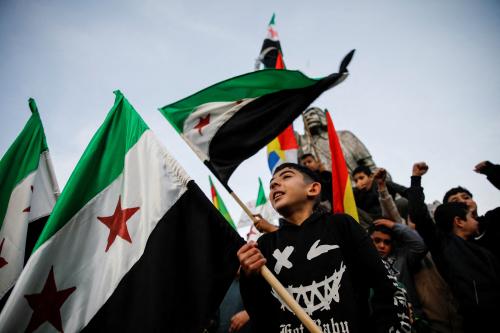Imagine that after Richard Nixon’s resignation in 1974, Gerald Ford became president—for life. Imagine that over the next 24 years, he declared a state of emergency and ruled over a tame parliament and hobbled opposition, holding on to power through clever politicking, brute force, and good luck. Something like this scenario describes modern Egypt and its longest-serving head of state, Hosni Mubarak—who then surprised his ruling party, his country, and the world last Saturday by announcing his support for a constitutional amendment that would allow others to run against him in the presidential election planned for this coming fall.
The 76-year-old Mubarak’s hold on power appeared to be absolute and his love for it unyielding: so much so that his sudden gesture at first blush appears to signal a rupture in Arab politics, the crack in the dam that will unleash democracy in the Middle East. But a closer look at Mubarak’s nearly Pharonic reign shows that his genius is not for grand gestures. It’s for riding the waves of a turbulent region and emerging on top, if never in brilliant style. Seen in this light, Saturday’s move is less a big shift in response to mounting internal and external pressures than a hard-nosed concession designed to strengthen and lengthen his waning days in office while he prepares the ground for his ruling party to carry on without him—possibly with his son at its helm.
When he took office in 1981 after Anwar Sadat’s assassination by Islamist radicals, Mubarak really did have a lot in common with Gerald Ford. After an unexpected elevation, his main task was to stabilize a country traumatized by years of upheaval. Sadat had made three dramatic decisions over the previous decade, the consequences of which his successor was left to absorb. Sadat abandoned the unified Arab strategy of rejecting Israel and made a separate peace at Camp David in 1978, taking back for Egypt the strategic Sinai Peninsula and its valuable oil fields. He ended Egypt’s dependence on Soviet aid and military advisers, reorienting the country toward Washington during the Cold War. And with his policy of infitah—Egypt’s version of glasnost—he began to chip away at the state-dominated economy that was the Socialist legacy of Gamal Abdel Nasser.
Mubarak had to handle the fallout from the Sadat years and tamp down the radicalism that had led to the assassination. Declaring a state of emergency (which he has renewed every three years since), Mubarak used mass arrests and military courts to cut through Egypt’s Muslim Brotherhood and its violent offshoots, including the Egyptian Islamic Group. Still, the popularity of radical Islam grew. By the early 1990s the regime had a serious threat on its hands, with Islamist terrorists attacking tourists, members of the Coptic minority, and even security forces. The already miserable economy began to tank. So, along with the crackdowns, Mubarak co-opted moderate Islamists by devoting more state resources to religious education and more state TV hours to religious broadcasts. He also drove out of the country those extremists he didn’t manage to arrest—among them, Osama’s right-hand man, Ayman al-Zawahiri, and Sheik Omar Abdel Rahman, the guru behind the 1993 World Trade Center bombing.
Repression and seduction did not alone this Pharaoh make. Mubarak also entrenched himself by being a different kind of president from his predecessors. Nasser’s pan-Arab ideology embroiled Egypt in intra-Arab disputes at the price of domestic welfare, and Sadat’s bold moves toward Israel and the United States came along with an outsized persona that, after Camp David, became a target of widespread resentment. Mubarak, by contrast, eschewed the cult of personality. One story has it that when accosted by a fawning courtier shortly after taking office, he barked, “My pockets are empty, I have nothing for you.” Like Ford, who was mocked as dull and clumsy, Mubarak suffers a regular round of jokes in Cairo about his supposed love of drink and his dimwittedness.
But Mubarak isn’t dim. He’s a shrewd judge of external political winds, and he has navigated Egypt skillfully back from the regional isolation it endured after the Camp David Accords to a central place in Middle Eastern politics. He was the only Arab leader to know in advance of the secret Oslo talks between Israel and the PLO in 1993, and when the inexperienced Palestinians needed a lawyer to review the proposed Oslo Accords, Mubarak sent one of his own. More recently, he has chided Palestinians that Ariel Sharon—whom he once shunned as an enemy and a war criminal—is their best hope for peace. His mediation helped bring about the cease-fire that Palestinian militants agreed to after Yasser Arafat’s death last November. And while Egypt’s interest in Middle East peace is independent of America’s, Mubarak’s help with the peace process (and with the containment of Libya and the 1991 Gulf War) has netted Egypt more than $50 billion in U.S. aid, along with debt write-offs that have kept the country solvent at critical moments.
Having spent much of his rule overcoming the upheavals of the past, Mubarak’s watchword is stability. The word features in every speech he gives—particularly when he talks about reform, which he always intends to enhance stability. And that stability, in the form of a modern if authoritarian bureaucracy, a vibrant culture, and an increasingly market-driven economy, may in fact be Mubarak’s greatest achievement. Under his rule, Egyptians have become accustomed to a robust presidency and a parliament elected within a formally multiparty system.
But they have also gotten used to Mubarak’s National Democratic Party, which is so thoroughly dominant that, even with more competitive elections, it’s not clear when it would ever lose its majority. Using the familiar tactics of patronage, electoral manipulation, and intimidation, the NDP increased its parliamentary majority from 68 percent in 1985 to 94 percent in 1995. Today, following gains by independent Islamists, the NDP still holds about 85 percent of the seats. The ruling party dominates the legislative agenda—and more important, the Political Parties Committee, which decides which new political parties are legal. In recent years, aspiring parties from across the spectrum have had their applications rejected. The newest party, Al-Ghad, was legalized at last in November 2004. But last month its charismatic young leader, Ayman Nour, was stripped of parliamentary immunity and arrested, prompting Condoleezza Rice to cancel her planned visit to Cairo. Nour would have been a likely candidate to run against Mubarak in this fall’s voting—but if he is convicted, he won’t be on the ballot. So much for pluralism.
Meanwhile, the NDP’s central decision-making body is run by a man who owes his life to Mubarak: the president’s younger son, Gamal. While father and son both deny any interest in dynasty, even if Nour is released no viable alternative to Mubarak’s NDP exists in Egypt today. Within the NDP, the younger reformers are backing Gamal. It’s hard to imagine the ruling party nominating anyone else to run in Hosni’s place, should he finally retire when his next six-year term expires. The alternative would be for Mubarak to install his intelligence chief, Omar Suleiman, as vice president so he could take over if Mubarak were to die in office. But the ascension of another military man through an appointed vice presidency would peel away the democratic veneer of Egyptian politics—and that might generate enough international pressure and domestic resentment to threaten the stability Mubarak so treasures.
Without real political freedom in Egypt, it’s hard to see how much will change when Mubarak is gone. Having speared the ghosts of the past, he should feel secure enough to prepare his country for a more democratic future. But Gerald Ford never had much of a vision thing going, and neither does Mubarak. Given the NDP’s dominance, his nod to democratic norms won’t prevent him from winning a fifth term. Unless Mubarak or his successor lifts the state of emergency, dismantles the Political Parties Committee, and allows open debate, Egyptians will miss their chance for gradual transformation—and start thinking, along with other Arabs, about hitting the streets.
The Brookings Institution is committed to quality, independence, and impact.
We are supported by a diverse array of funders. In line with our values and policies, each Brookings publication represents the sole views of its author(s).



Commentary
Op-edHosni Mubarak: Elections Or No, He’s Still Pharaoh
March 3, 2005